
The Candidates 2016 and Foreign Policy - Page 2
Our founding fathers were deeply divided on the issue of American foreign policy. Despite owing their independence to the intervention of foreign powers largely waging a proxy war on our soil, many of them firmly believed it wise to avoid "foreign entanglements." This country struggled for over a century to be an isolated land that lets the rest of the world take care of itself, until the first half of the Twentieth Century let everyone know that such an attitude is no longer feasible for a superpower. Then, in the decades after World War II, a different lesson was taught, one about the consequences of excessive intervention, of stretching our military might too far, and of trying too hard to force our will on an unruly world. Then September 11th happened. We find ourselves now in a curious limbo, pulled in the opposite directions of increasing our military presence around the world or falling back behind our own borders in retreat. Regular readers might be shocked to learn I applaud the Obama administration for trying to have it both ways, but unfortunately, the results speak for themselves: pulling out of Iraq helped create an even greater threat in ISIS; Russia is defiantly swallowing up her neighbors; Iran is even closer to a nuclear bomb; chemical weapons are being used routinely in Syria and nobody cares anymore; we continue to get hit hard by "lone wolf" terrorists inpired by overseas hatred; Lybia is a disaster; terrorism is spreading to places like Paris and London; and our closest allies are getting more and more perplexed by our placing diplomatic relations with Iran and Cuba ahead of our promises to them. The world is on fire--more dangerous and destabilized than it was when President Obama took office--and it's a miracle we've been able to stay as insulated from it as we have. I don't claim to know what the answer is to all this, but I do know one thing: we need a leader with a consistent, articulated vision for foreign policy.
Iran
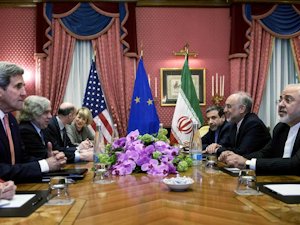 | | "So you give us a bunch of money, stop sanctioning us, and agree to keep your military away, and we can continue to blame your country for everything, plot against Israel, and export terrorists throughout the Middle East? What a bargain!" |
I oppose the Obama administration's deal with Iran. On one hand, I'm fine with lifting sanctions--they don't work anyway--and I see no problem with engaging diplomatically with a hostile state. It's better than war, right? However, the terms of the deal are ludicrously one-sided, not to mention the horrible precedent it sets for putting treaty powers in the hands of the executive branch as opposed to its proper, constitutional place in the legislative. At this point, there's no way to prevent Iran from becoming a nuclear power, and that is more terrifying than ISIS or the Syrian Civil War. Mutually Assured Destruction worked for the Cold War, but in this century, with exported terrorism replacing military blockades, can we really trust Iran not to give a nuclear weapon to an organization like ISIS that might want to use it on American soil? Suicidal homicide is what modern terrorism is all about, and that pretty much negates the underlying theory of Mutually Assured Destruction. My ideal president would nullify the Obama/Iran deal on his or her first day of office, because it is an illegal, dangerous treaty. Then he or she would express a new guiding principle for dealing with Iran, one that would strive to prevent its nuclear ambitions and keep it from supporting the kinds of terrorists who routinely call for Death to America. Also, he or she would work with Congress, not unilaterally behind closed doors.
Calling the deal "the best of undesirable options," Hillary Clinton promises to "vigorously enforce" the terms of the deal with a guiding principle of "distrust and verify." She wants to increase efforts to contain Iran's military, rebuild our relationship with Israel and offer more military support in its efforts against the nation, and "confront all of Iran's negative actions."
Gary Johnson's view of the Iran deal has evolved fairly rapidly from firm rejection of it for increasing the flow of money to terrorists and for its lack of transparency to feeling "optimistic" about it. He calls Iran a sponsor of terrorism and doesn't believe we should have unfrozen Iranian assets, but he doesn't support economic sanctions on general principle.
Aside from arguing that we shouldn't go to war with Iran, Jill Stein has precious little to say on the matter. She believes diplomacy can not only prevent Iran from achieving a nuclear weapon but could also create "a nuclear-free Middle East and a nuclear-free world." She believes the deal made with Iran "addressed a threat that does not exist," but supports it nonetheless as a small first step towards her goal of universal nuclear disarmament.
Donald Trump wishes to renogotiate the Iran nuclear deal, demand that every American hostage be released, and impose harsher sanctions on the nation. He has repeatedly called for an immediate nullification of the deal once he becomes president (despite what his top foreign policy advisor claims), but only because he thinks he can make a better one with which to replace it.
I do believe that Clinton would be tougher on Iran than Obama has been, but her support of the treaty gives me pause. Similarly, while I'm glad Trump wants to get rid of the treaty, I'm wary of his insistence on simply making a new one unilaterally. The only candidate who seems to recognize the danger the deal poses to the constitutional order of things is Johnson, even though he now claims to be "optimistic" of it with reservations. Finally, there's Stein, who seems to think we can put the genie back in the bottle with nothing but diplomatic dream-making. I'm willing to give Johnson a point, because I don't support economic sanctions and I want a candidate who is inherently skeptical of the illegal treaty the current administration struck with an enemy state that sponsors terrorism. Clinton and Trump don't get points because they believe in sanctions and treaties formulated solely by the executive branch of the federal government, things I just can't approve of.
Russia
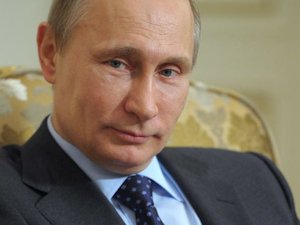 | | More Bond villain than admirable ally |
Ever since Vladimir Putin took charge of Russia, the country has been provocative to American interests, albeit indirectly. The hostile invasion of Ukraine, the harboring of an American fugitive in Edward Snowden (he is a fugitive, regardless of what you think of his crimes), and the support of an increasingly brutal Syrian regime, to name just a few recent examples, are not, in and of themselves, a clear and present danger to America. However, they create a pattern of bold defiance and saber-rattling, one that necessitates a strong, diplomatic response. We need a president willing to stand up to Putin and formulate a strategy for engaging with Russia that would minimize the provocative actions the country is taking. At the very least, we need a president who is capable of forcing Putin to give us Snowden, whose continued presence in Russia is simply unacceptable.
Given Clinton's aforementioned Syria strategy, which would defy Putin, it's no real surprise that she's calling for a much tougher stance against Russia. She believes she can "stand up to Vladimir Putin" and go "toe-to-toe" with him in ways the present administration has been unwilling to do. She's already publically accused Russia of interfering with the upcoming election, and apparently, her reputation is enough to worry the Kremlin about her potential presidency. She has also been very critical of Edward Snowden, calling for him to immediately return to the United States to face the music.
Gary Johnson believes we shouldn't interfere in Russia's aggression towards the Ukraine, would consider giving Edward Snowden a presidential pardon, and as previously mentioned, thinks we must work cooperatively with Vladimir Putin if we wish to do anything in regards to Syria.
From Moscow and shortly before sitting down with Putin at a formal dinner, Jill Stein announced her plan for "principled collaboration" with Russia towards reducing military spending and intervention in both countries. She believes "ending our multinational fossil fuel addiction will make disastrous wars for oil obsolete," leading to a world where military interventions simply don't occur.
Donald Trump has famously been very supportive of Vladimir Putin, even throughout his presidential campaign. He has said, "if we could actually be friendly with Russia," it would be "a good thing." He has publically begged Russia to hack his opponent's e-mail. He has refused to condemn Russia for the invasion of the Ukraine. Additionally, though he hasn't expressed any interest in forcing Russia to release him to American custody, he has called Edward Snowden a traitor who deserves summary execution.
Three of these candidates would allow Putin to essentially continue his provocative actions against American interests. Hillary Clinton, however, doesn't mind poking The Bear. She also wants to bring Snowden to justice, but rather than just executing him as Trump suggests we should, she believes he can get a fair trial. She has condemned the invasion of the Ukraine, has no interest in working with Russia and Assad in Syria, and has the diplomatic clout to stand up to Putin's bully tactics and bravado. Therefore, she easily gets a point, whereas the other three do not.
The Scorecard
 | | 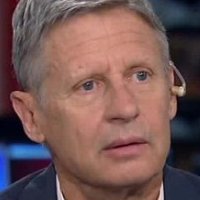 | CLINTON:
3 | | JOHNSON:
1 | | | | 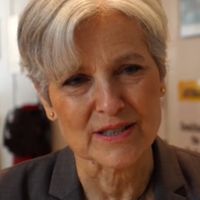 | | 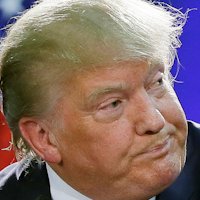 | STEIN:
0 | | TRUMP:
1 |
|
 | |  | CLINTON:
3 | | JOHNSON:
1 | | | |  | |  | STEIN:
0 | | TRUMP:
1 |
|
Say what you will about the horrific failures in Lybia when she was Secretary of State under President Obama, I honestly believe Hillary Clinton is the strongest candidate on foreign policy. When she was Secretary of State, she was always pushing Obama to be stronger, and she has a better grasp of the reality of the international world than all three of her competitors combined. A Clinton administration would be more hawkish than Barack Obama but less gung-ho than George W. Bush, and that's the middle ground we desperately need to maintain these days. While I don't agree with her on everything (and while I will hold Benghazi against her until the day I die), I would vote for her if foreign policy were the only relevant issue in this election.
-e. magill 10/6/2016
|
|